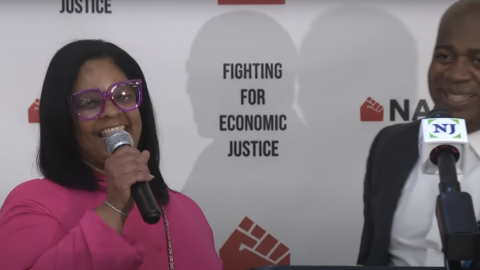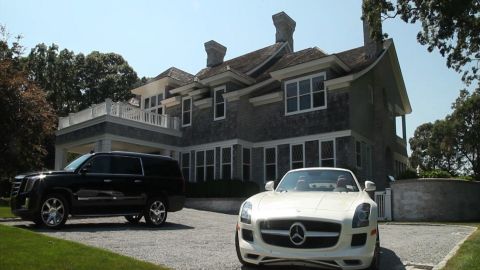JUDY WOODRUFF: Portland, Oregon, is known as a hub of liberal and progressive thought.
It's also one of the most gentrified big cities in the country.
Now an ambitious new program, which some experts are calling the first of its kind, aims to
atone for the repeated displacement of thousands of African-American families from North and
Northeast Portland.
In a city with soaring home prices and a steady pattern of gentrification, can it make a difference?
Amna Nawaz and producer Mike Fritz recently traveled to Portland to see firsthand how
it's all playing out.
AMNA NAWAZ: For Giovanni Battles And Ashley Rollins, this part of Portland has always
felt like home.
You were just surrounded by family growing up?
GIOVANNI BATTLES, Portland, Oregon: Oh, that's it, yes.
Everyone knew somebody.
You would drive by my grandmother's any day, it would be five to 10 people, cousins, everybody
out there.
You would stop and turn into an impromptu barbecue.
AMNA NAWAZ: Ashley was raised by her mother and grandparents, trailblazers in their time.
ASHLEY ROLLINS, Portland, Oregon: She was the first woman, African-American woman judge
in Portland.
And then my grandfather, he was actually a Tuskegee Airman.
AMNA NAWAZ: Ashley and Giovanni's roots here may run deep, but when the former high school
sweethearts looked for a place to raise their sons, the neighborhood they once called home
was out of reach.
ASHLEY ROLLINS: We went to high school in this neighborhood.
This is what feels like home and comfortable for us, so our hope was to live here, but
things have just, like, changed drastically.
AMNA NAWAZ: That change traces back to the displacement of thousands of African-American
families from North and Northeast Portland since the 1960s, forced out by waves of city
development and gentrification.
Portland's policies that led to that exodus are deeply rooted in the state's past, according
to Walidah Imarisha, who studies Oregon's racial history,
WALIDAH IMARISHA, Expert on Black History in Oregon: The Oregon territory passed laws
like the black exclusion law in 1844 that outlawed black people from living in Oregon.
It also included the lash law that said black people would be publicly whipped every six
months up to 39 lashes until they left the state.
AMNA NAWAZ: The few who stayed in Portland were mostly relegated to the North and Northeast,
by 1960 home to more than 80 percent of the city's black population.
For years, the area saw little to no investment, ignored by lenders and developers.
Property values plummeted.
But, by the 1970s, a series of city projects, including a basketball arena, a new highway,
and a proposed hospital expansion took over huge sections of land, razing hundreds of
houses in the way.
Private money poured in.
So did new homeowners who could afford to live here.
Many existing residents were priced out.
Fast-forward and the neighborhood that was 68 percent black in 1990 was just 28 percent
black by 2010.
WALIDAH IMARISHA: When folks say, well, why aren't there more black people in Oregon,
why aren't there more communities of color in Oregon, it's important to recognize that's
the foundation of it.
AMNA NAWAZ: Today, just 6 percent of all Portland residents are black, and the average home
price in North and Northeast Portland is more than $500,000.
But to Ashley and Giovanni's surprise, the same city that played a role in driving out
so many of their friends and family now stepped in to help them buy their first home through
a preference policy that's been dubbed by many as a right to return.
GIOVANNI BATTLES: I think acknowledging a wrong is done is the first step, and I want
to thank them for the opportunity that we took advantage of.
AMNA NAWAZ: Started in 2015, the program set aside $20 million for current and former residents
of North and Northeast Portland, offering down payment assistance to 65 new homeowners,
more affordable rental units, and home improvement loans to help residents stay in the area.
Families who could prove their grandparents or parents were displaced from these neighborhoods
got priority.
But not everyone wants to return.
GERMAINE FLENTROY, Oregon: I have never walked from 15th to 17th since we left out of this
neighborhood.
This is my first time ever walking this far.
AMNA NAWAZ: These two blocks?
GERMAINE FLENTROY: These two blocks.
I mean, I don't feel welcome here.
AMNA NAWAZ: Germaine Flentroy grew up on this Northeast Portland block.
He left in 2001 as his family's rent spiked and the neighborhood began changing.
GERMAINE FLENTROY: Back then, white people wouldn't come in this neighborhood.
Right?
They wouldn't come in this neighborhood at all.
Then, all of a sudden, you just started seeing like the hipsters, right?
And that's really, really getting to be -- then, all of a sudden, we started seeing community
gardens.
And we were like, what are these people doing?
Why are they so weird?
AMNA NAWAZ: Today, he qualifies for the city's right to return program, but the area, he
says, is no longer home.
GERMAINE FLENTROY: There's nothing here for me.
When they have this program right to return, I still don't understand, what are we returning
to?
LESLIE GOODLOW, Portland Housing Bureau: I talk to people every single day that want
to move back into Northeast Portland.
AMNA NAWAZ: Leslie Goodlow is the Portland Housing Bureau's equity and business operations
manager.
LESLIE GOODLOW: They want to live in the same neighborhood that their grandmother lived
in.
They want to live in the same neighborhood that their church is still in,.
They want to live in the same neighborhood where their barbershop or their beauty salon
still is.
AMNA NAWAZ: But three years in to a five-year plan, Portland's right to return program is
not hitting its marks; 1,000 people applied to buy homes.
The city's goal was to fill 65 slots.
To date, they have only moved in six new homeowners.
Those numbers led Portland's mayor to call the program an abject failure.
LESLIE GOODLOW: Getting a mortgage is not easy.
And if you're only making, you know, $40,000 a year, you can't afford, you know, a $200,000
or $300,000 mortgage.
AMNA NAWAZ: How did you not know that the same people that had been disenfranchised
for so long and moved to the bottom of the priority list for so long wouldn't immediately
be available and ready to make that kind of leap?
LESLIE GOODLOW: So, some people could get ready in six months, and some people might
take three years.
And do we hold a slot for somebody that's three years out, or do we move somebody else
up?
And so that's been the struggle
AMNA NAWAZ: Meanwhile, home prices in Portland continue to rise.
MAXINE FITZPATRICK, Portland Community Reinvestment Initiatives Inc.: Property values over the
course of the last 10 to 15 years are up somewhere in the range of 400, 500, 600 percent.
AMNA NAWAZ: Which is why Maxine Fitzpatrick says these rental units could offer the city
some success.
Her nonprofit is working with Portland to build more low-income rentals as part of the
right to the return program.
MAXINE FITZPATRICK: our whole thinking around rental property is that it allows them an
opportunity to stabilize, so they don't have to worry about being uprooted, you know, at
the given will of the landlord.
AMNA NAWAZ: But experts say the key to building wealth is owning a home, and that's where
the program is failing.
LISA BATES, Portland State University: The program very much needs to be retooled and
rebooted to face the realities of the market.
AMNA NAWAZ: Portland State University's Lisa Bates examined the right to return program
earlier this year, and she gives the city credit for putting it in place.
But whether or not it makes a difference, she says, is something the rest of the country
will be watching.
Similar efforts to bring back families with ties to gentrified neighborhoods are now under
way in New York, Philadelphia, Austin, and San Francisco.
LISA BATES: When it comes to a history of racial segregation, of exclusion, of sort
of containment of the African-American community into a very small neighborhood, followed by
the dispersal of those same exact white families with gentrification, it's extremely typical.
This is a very basic story of urban history and urban planning in pretty much every city
in the country.
AMNA NAWAZ: That's a history Cornelius Swart has spent years documenting.
His new film, "Priced Out," tracks the dramatic change in Northeast Portland.
He first moved here in the 1990s.
CORNELIUS SWART, Filmmaker: We have spoken to folks who had said that when the neighborhood
first started gentrified, that first wave, of which I was a part of, folks were conscious
that it was a black neighborhood.
Now, the last five or six years, there's been this erasure of history.
People moving here, they don't even know it used to be a black neighborhood.
GERMAINE FLENTROY: This was my grandmother's house, right?
AMNA NAWAZ: Just across the street there?
GERMAINE FLENTROY: Just across the street.
This is where my -- predominantly, my main family grew up.
AMNA NAWAZ: For Germaine Flentroy, walking these streets today is a reminder of everything
he had to leave behind.
GERMAINE FLENTROY: We feel like this was stolen from us.
Like, we feel angry about it.
At least, me personally, I feel angry about this.
LESLIE GOODLOW: There's no way to make it right.
We're talking about a community that was basically bulldozed.
And we're going to be able to probably bring back maybe 2,000 families if we're lucky.
AMNA NAWAZ: Some people will say Portland had an image problem it was trying to fix.
Is that fair?
LESLIE GOODLOW: Well, that's probably some of it.
But it is a way for the city to demonstrate we recognize what we did.
We want to try to do something.
AMNA NAWAZ: The neighborhood isn't what they remember, but Giovanni and Ashley say they're
now focused on making new memories.
GIOVANNI BATTLES: The best feeling is knowing that we set a foundation for our kids.
Owning a home is the first step.
It's a stepping up in economic class.
And so that's the -- honestly, the best feeling I have is knowing that my kids have something.
AMNA NAWAZ: A first step towards a future, still firmly rooted in their past.
For the "PBS NewsHour," I'm Amna Nawaz in Portland.
JUDY WOODRUFF: That story and more from our series Chasing the Dream.
The series on our Web site, PBS.org/NewsHour.



